After months of public scrutiny, investigations, lawsuits and arrests, the Columbus Police Vice Unit met its end in a minute-long video on social media.
“I removed three officers from their Vice assignments and notified the seven remaining Vice officers that I am abolishing their assignments,” announced Interim Police Chief Tom Quinlan on Tuesday night.
The Vice Unit has been making headlines for several months. Last July, some Vice officers made national news for arresting porn star Stormy Daniels for illegal touching at a strip club. An Ohio law known as the "Community Defense Act," passed in 2007, prohibits anyone who is not a family member from touching a nude or semi-nude dancer.
The next day, Columbus City Attorney Zach Klein dropped the charges against Daniels. He later deemed the law “legally problematic.” Klein later dropped charges against two other women arrested with Daniels.
In August, then-Vice officer Andrew Mitchell shot and killed Donna Castleberry in an unmarked car after she stabbed him during a prostitution-related arrest.
The next month, then-Chief Kim Jacobs suspended the Vice Unit to conduct an internal review.
“We do not tolerate bad cops here,” Jacobs said in September. “And if we've got the evidence to prove that they are, then I think our record shows that we will address that bad behavior.”
That review isn't over yet. Jacobs also requested an outside investigation from the FBI, which is still ongoing.
Now that the Vice Unit has been disbanded, it's unclear how the police will enforce drug, alcohol and prostitution crimes. And in the wake of such public controversies, community members question how the division as a whole will move forward.
What Was Wrong With Vice?
Since Columbus Police began its internal investigation, three Vice officers have been relieved of duty, including Mitchell.

Last week, the Justice Department indicted Mitchell, alleging he kidnapped victims under the pretense of arrest and forced them to have sex for their freedom. Mitchell faces seven federal charges and the possibility of likelihood in prison.
Following Mitchell's indictment, the City Attorney's Office dismissed 18 cases from Mitchell charging women with prostitution-related offenses. Mitchell has since retired in "bad standing" from the department.
But Quinlan did not explicitly connect Mitchell's case to the closure of Vice.
“While today's decision is not a reflection on all the officers assigned to Vice, it has become clear there's a better method of addressing the community's needs when it comes to the enforcement of prostitution, alcohol and gambling,” Quinlan said in the video.
In a press release Tuesday, Columbus Police said it will address Vice-related crimes "using a community centered approach." Neither the department nor Quinlan elaborated on what that new method entails.
Community group People’s Justice Project has called for reforms to Columbus Police for several years. Organizer Tammy Fournier Alsaada says the police need to include diverse voices in the conversation.
“You cannot address the community’s needs without the community at the table, and the table often times, when our police department thinks to invite the community, it’s often the people at the table that agree with them,” Alsaada says. “It’s never people who have concerns or lodged complaints, and we have to figure out what that looks like.”

Alsaada says officers are often protected from facing the consequences of their actions.
“We are concerned that in any other case when an officer is under investigation, there's this heavy wall of fraternal order of police and protections that immediately come forth to protect an officer all the way to officers being fired and rehired,” Alsaada says.
A WOSU investigation in October 2017 found that, in the past decade, Columbus Police has fired 14 officers for misconduct and rehired three after an appeal from the Fraternal Order of Police.
Some Will Miss Vice's Work
Others in the community are concerned about the Vice Unit’s closure.
Local outreach volunteer Kelly Billups worked on several stings to help sex workers leave the industry. Known as the Linden Model, the effort was a partnership between Vice, the City Attorney’s Office and activists.
“Every officer that we encountered was beyond respectful to the girls and to us,” Billups says.
The program helped women get clothing, food and shelter, as well as avoid jail time. Billups said the partnership with police gave a fresh start to women addicted to drugs.
“Sometimes the only opportunity these folks will have to get clean is to go to jail,” Billups says. “We’ve had letters sent back to us about what an experience it was. 'Thank you very much for your group being there. Nobody’s ever treated me with such dignity and respect.'”

She hopes Columbus Police will put together another unit that activists can collaborate with to help people working in prostitution. In his video Quinlan says he’s working on a path forward, not just for prostitution, but for gambling, drugs, and alcohol.
“Soon I am meeting with the deputy chiefs to develop a new model for enforcement,” Quinlan says. “Following this meeting, I will share the division's plans with the community.”
The timing of that meeting has not been announced. A department spokeswoman said patrol and human trafficking officers will take care of prostitution-related offenses in the meantime.
Updated March 21 at 11:56 a.m.
If you have information to share about the Vice Unit, contact WOSU at adora@wosu.org.





